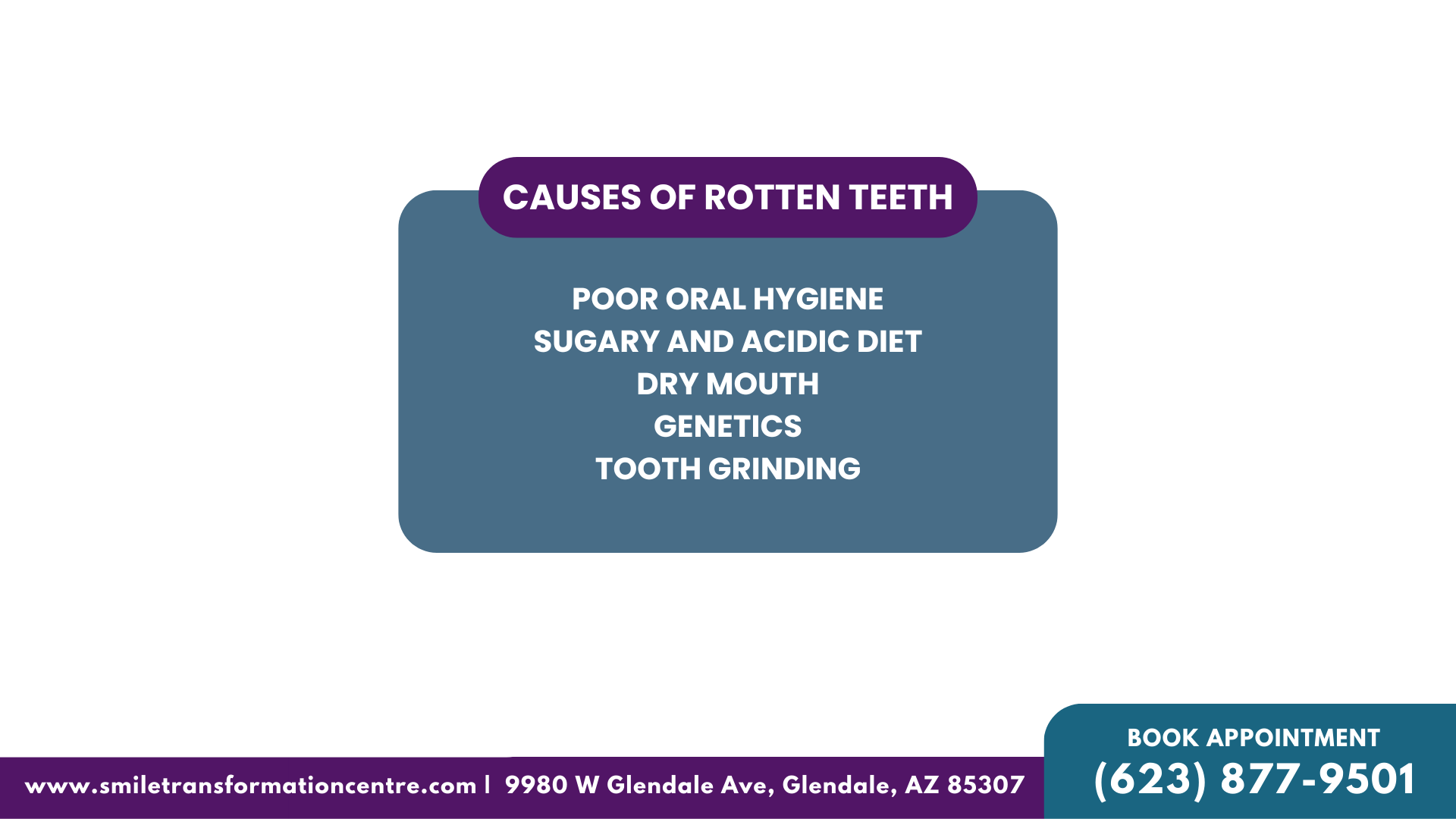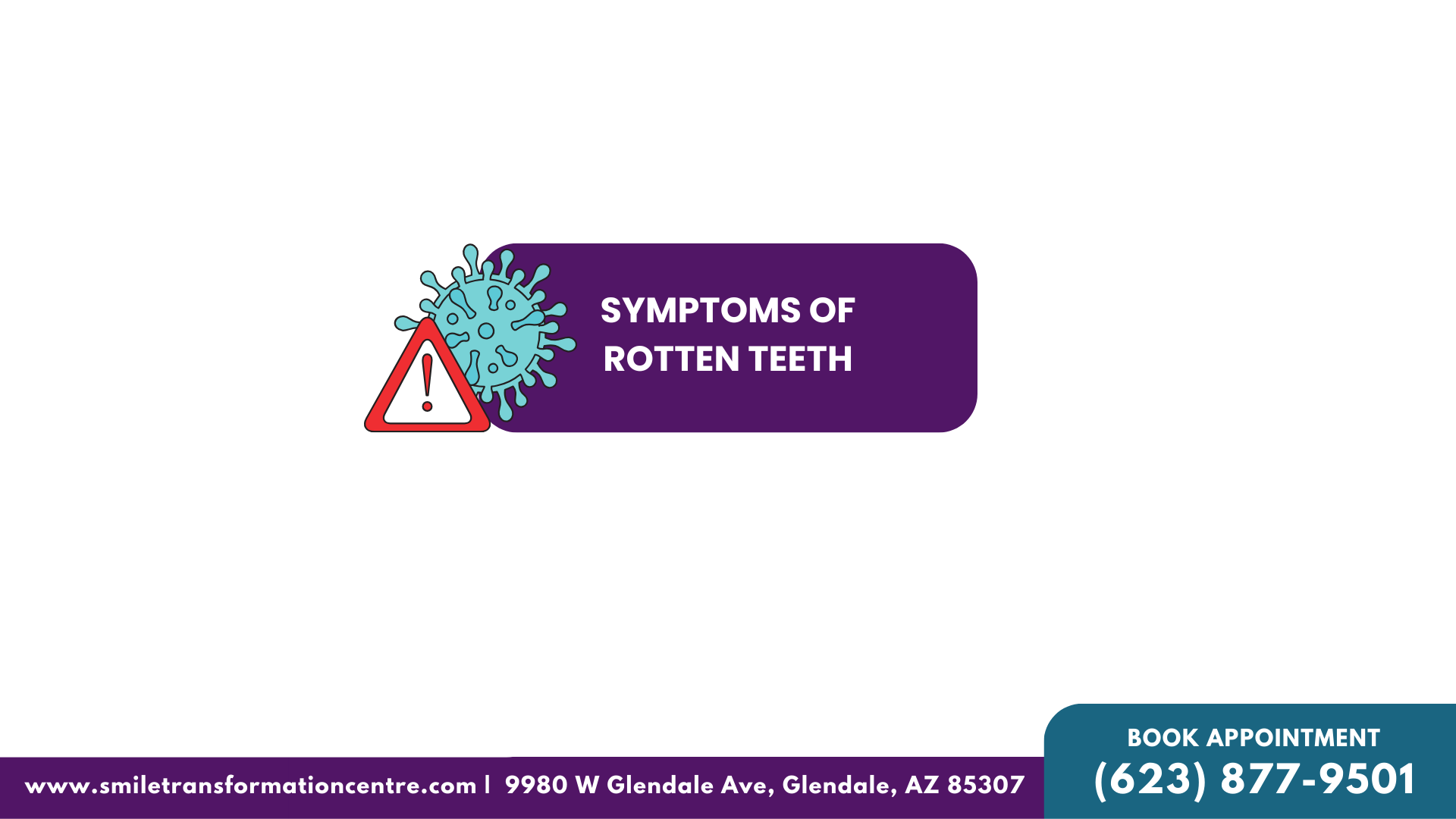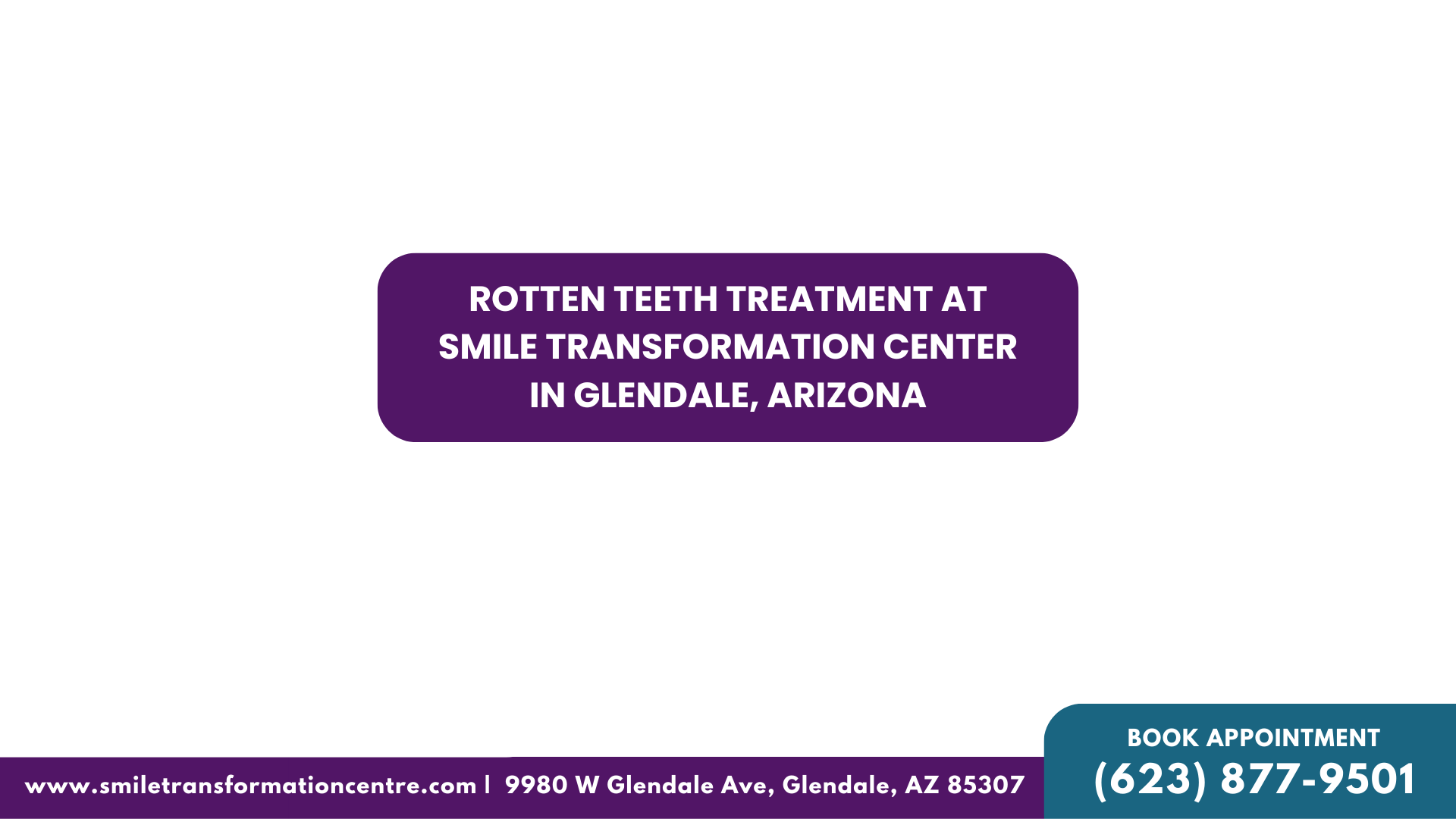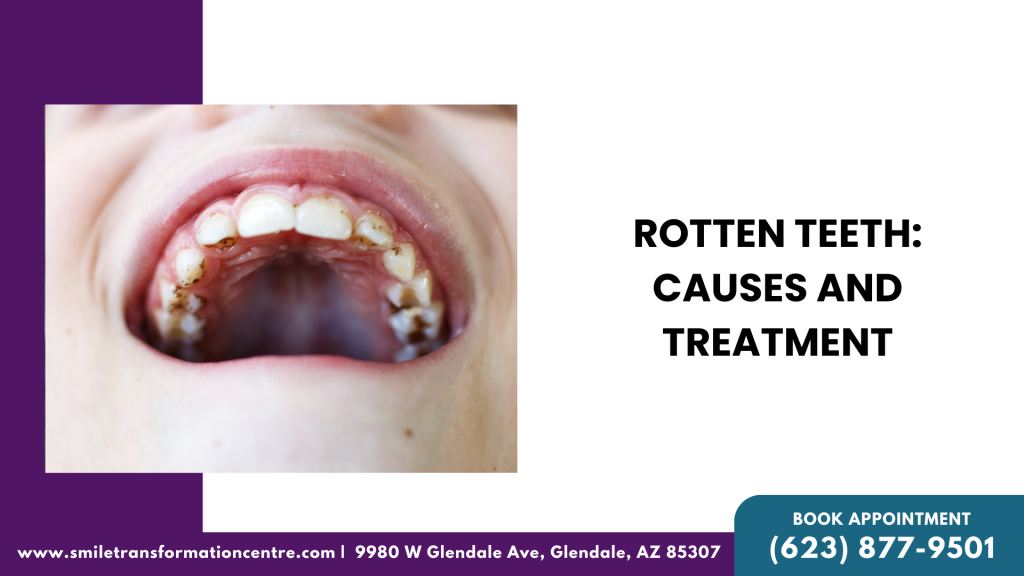Rotten Teeth, also known as dental decay or cavities, can be a painful and distressing dental issue that affects people of all ages. Treatment for rotten, or decayed teeth is often misunderstood and feared, but itis a vital dental procedure that can save teeth from extraction and alleviate pain caused by infections. By dispelling myths and understanding the steps involved, individuals can approach rotten teeth treatment with confidence, knowing that it is a routine and essential aspect of modern dentistry. In this blog, we will delve into the causes of rotten teeth and explore effective treatment options to help you maintain a healthy and vibrant smile.

Causes of Rotten Teeth
Rotten teeth can stem from various factors, such as poor oral hygiene, excessive sugar intake, untreated dental issues, etc. By understanding these root causes in detail, one can empower themselves to take proactive steps towards preventing and addressing rotten teeth.
1. Poor Oral Hygiene
Neglecting proper oral care practices, such as brushing and flossing, can lead to the accumulation of plaque—a sticky film of bacteria on the teeth. Over time, this dental plaque can erode tooth enamel, resulting in decay and the development of cavities.
2. Sugary And Acidic Diet
Consuming excessive amounts of sugary and acidic foods and beverages provides a breeding ground for harmful bacteria in the mouth. These bacteria produce acids that contribute to enamel erosion and, ultimately, tooth decay.
3. Dry Mouth
Conditions that cause dry mouth, such as certain medications or medical conditions, can contribute to an increased risk of tooth decay.
4. Genetics
Some individuals may be genetically predisposed to weaker enamel or other dental issues, making them more susceptible to developing rotten teeth.
5. Tooth Grinding
Persistent teeth grinding, also known as bruxism, can wear down enamel and expose the underlying dentin, making teeth more susceptible to decay.

Symptoms of Rotten Teeth
Identifying the signs of rotten teeth early is crucial for prompt intervention and effective treatment. Here are common indicators that may suggest the presence of dental decay:
1. Tooth Sensitivity
Increased sensitivity to hot or cold temperatures or discomfort while consuming sweet or acidic foods can be an early sign of enamel erosion and dental decay.
2. Persistent Toothache
Unexplained and persistent toothaches, especially when biting or chewing, may indicate decay that has progressed to the inner layers of the tooth.
3. Visible Holes or Pits
Visibly noticeable holes, pits, or dark spots on the surface of the teeth are clear indications of dental decay and the presence of cavities.
4. Bad Breath (Halitosis)
The bacteria responsible for tooth decay can produce foul-smelling compounds, leading to persistent bad breath.
5. Discoloration of Teeth
Changes in the colour of the teeth, such as white, brown, or black spots, can signify enamel breakdown and decay.
6. Swollen or Bleeding Gums
Infected teeth can cause inflammation in the surrounding gums, leading to swelling, redness, or bleeding during brushing.
7. Pain or Discomfort While Eating
Difficulty or discomfort while eating, especially when applying pressure to the affected tooth, can be a sign of advanced decay.
8. Visible Pus Around The Tooth
Advanced decay and infection may lead to the formation of pus around the affected tooth, accompanied by swelling and tenderness in the surrounding area.
9. Changes in Tooth Shape or Size
Decay can alter the structure of the tooth, causing changes in its shape or size. Irregularities in tooth appearance may be indicative of underlying dental issues.
10. Cracked or Fractured Teeth
Weakened teeth due to decay are more prone to cracking or breaking. If you notice any fractures, it could be a sign of compromised tooth integrity.
If you experience any of these signs or a combination of them, it’s essential to seek professional dental care promptly. Early detection and intervention can prevent further damage, preserve your oral health, and restore your smile effectively. Regular dental check-ups are also crucial for identifying potential issues before they escalate.

Rotten Teeth Treatment at Smile Transformation Center in Glendale, Arizona
Rotten teeth require prompt and appropriate treatment to address the decay, alleviate pain, and restore oral health. Our skilled Root Canal dentists in Glendale offer a range of treatment options tailored to address rotten teeth. The specific treatment approach will depend on the extent of decay and the condition of the affected tooth. Here are common treatments for rotten teeth that we at Smile Transformation Center can provide.
1. Dental Fillings
For minor to moderate decay, dental fillings are a standard and effective treatment. The dentist will remove the decayed portion of the tooth and fill the cavity with a suitable dental material, such as composite resin, amalgam, or porcelain.
2. Root Canal Therapy
When decay reaches the pulp (the innermost part of the tooth containing nerves and blood vessels), a root canal may be necessary. This procedure involves removing the infected pulp, cleaning the root canal, and sealing it to prevent further infection. A crown is often placed on the tooth afterwards for added strength.
3. Dental Crowns
Dental crowns are used to cover and protect teeth that have undergone extensive decay or root canal therapy. Crowns are custom-made caps that fit over the damaged tooth, restoring its shape, strength, and functionality.
4. Tooth Extraction
In cases of severe decay where the tooth cannot be salvaged, extraction may be recommended. Tooth extraction prevents the spread of infection to surrounding teeth and tissues.
5. Dental Bridges and Implants
If a tooth is extracted, options like dental bridges near me or implants may be considered to fill the gap and maintain proper oral function and aesthetics.
6. Antibiotics
In cases of advanced decay accompanied by infection, our dentist may prescribe antibiotics to eliminate bacteria and prevent the spread of disease.
7. Improving Oral Hygiene Practices
Our dental professionals often emphasise the importance of good oral hygiene in preventing and managing dental decay. Proper brushing, flossing, and regular dental check-ups are essential components of effective oral care.
It’s crucial to consult with a dentist to determine the most suitable treatment plan based on the severity and specific circumstances of decayed or rotten teeth. Following the completion of the procedure, the patient’s dietary choices significantly impact the recovery phase. Explore our blog for insights into recommended foods and those to steer clear of post-treatment for decayed teeth. However, timely intervention can prevent the progression of decay, alleviate discomfort, and help preserve your natural teeth for a healthier, more confident smile. Regular dental check-ups play a vital role in early detection and prevention of dental issues.
Smile Transformation Centre specialises in cosmetic dentistry in Glendale, Arizona, providing comprehensive solutions for various dental concerns; it extends our expertise to tackling rotten teeth with personalised treatment options, including rotten teeth. So, what are you waiting for? Embrace a brighter, healthier smile with Smile Transformation Centre in Glendale, Arizona. Say goodbye to dental woes and hello to a confident, revitalised you. Schedule your consultation now, and let us transform your smile into a beacon of self-assurance!

